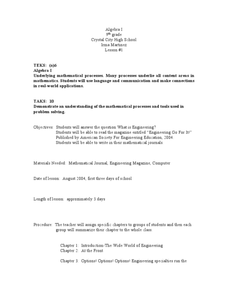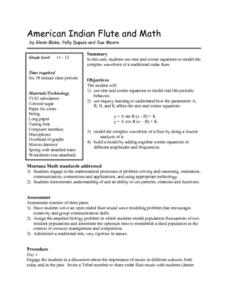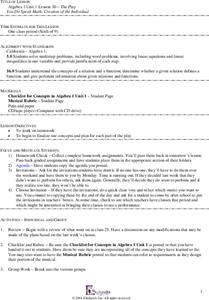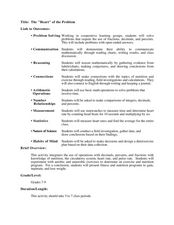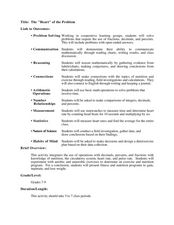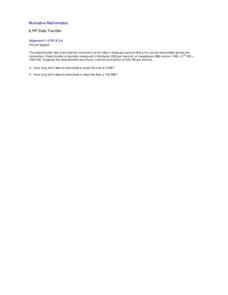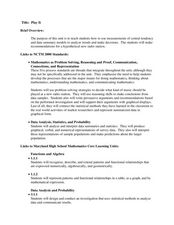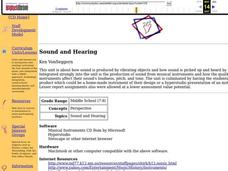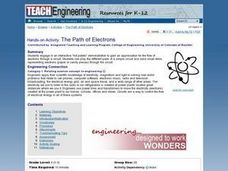Curated OER
Problem Solving Using Math
Students solve real life scenarios using algebra. In this word problem activity, students use different websites dealing with engineering as it relates to the real world and math. They use other resources such as magazines to solve word...
Bowland
Torbury Festival
Have you been to Torbury Fair? In the set of four lessons, learners solve a myriad of problems related to a music festival, including situations involving floods, market stalls, cows, and emergency plans.
Virginia Department of Education
How Much is that Tune?
Tune in for savings! Scholars investigate pricing schemes for two different online music download sites. After comparing the two, they determine the numbers of songs for which each site would be cheaper.
EngageNY
Using Permutations and Combinations to Compute Probabilities
Now that we know about permutations and combinations, we can finally solve probability problems. The fourth installment of a 21-part module has future mathematicians analyzing word problems to determine whether permutations or...
Curated OER
A Gigabyte of Music, How Much Is That
Students examine unfamiliar units of measure. They practice converting equations to fractions and converting one unit of measurement to another. They work together to solve equations.
Curated OER
American Indian Flute and Math
Students investigate the Math behind Musical instruments in this cross-curricular Math lesson plan on the Native American Flute and waveforms. The lesson plan can be accomplished in 6 days and includes an extensive materials list for...
Curated OER
The Play
Students work together to solve word problems. They examine the concepts of functions and relations. They develop plans for roles in the play they are creating.
Curated OER
Does Music Cam the Savage Beast?
Students collect, graph and analyze data. In this statistics lesson, students measure the heart beat of a person as they listen to music. They use the CBL and TI to create a graph, analyzing the outcome.
Curated OER
How Much Has Math Changed?
Students solve problems using the opposite, reciprocal and powers. In this algebra instructional activity, students solve problems with inequalities and absolute values. They show understanding of the basic content of math in this...
Curated OER
The "Heart" of the Problem
Students explore mathematical operations while studying nutrition. In this physical fitness lesson, students explore calories, pulse rate, and the circulatory system. Students use mathematical data to create a healthy physical fitness...
Curated OER
The "Heart" of the Problem
Students create an exercise and nutrition program. In this interdisciplinary activity, students use calculations of exercises plus their corresponding effects on the body and nutritional values of food to derive a health plan. Students...
Illustrative Mathematics
Data Transfer
A question to ask your class is, How fast is your Internet? That depends on the data transfer rate (DTR), which is the unit rate used in this activity. Math learners will calculate how long it takes to download a music file and a video...
Curated OER
Caloric Expenditure in Powwow Dancing
Sixth graders investigate the meaning of different types of Native American music and dance. They determine how this music and dance has contributed to modern music and dance. They problem solve to determine the average length of the...
Curated OER
Regressive Music
Student use the Ti calculator to graph sinusoidal graphs. In this calculus lesson plan, students use the CBL to collect and analyze data of sinusoidal graphs. They manipulate their collected data and make predictions.
Curated OER
Integration by Parts
Students explore integration by parts and use it to solve equations. In this calculus instructional activity, students sing a song about integration, and practice solving equations using integration by parts twice. They solve integrals...
Curated OER
Completing the Circuit
Students use a battery, wires, small light bulb and a light bulb holder to learn the difference between an open circuit and a closed circuit, and understand that electric current only occurs in a closed circuit. They describe the...
Teach Engineering
Tell Me Doc—Will I Get Cancer?
Can you beat the odds of cancer? In the first installment of a seven-part series, future biomedical engineers consider how to detect and diagnose cancer. An article on biosensors provides useful information toward this goal.
Alabama Learning Exchange
It's Around There Somewhere! Perimeter, and Circumference
Explore the concept of building equations for perimeter and circumference. Learners use rulers to measure the perimeter of half a sheet of paper. Then fold the sheet of paper numerous times, each time measuring perimeter. ...
Curated OER
Ratio Relationships
Students solve for the different ratio and proportion of a problem. In this geometry lesson plan, students show their knowledge of how to solve proportional relationships. They convert between percent, decimals and fractions.
Curated OER
Probability and Statistics
Students reason mathematically as they solve problems dealing with probability of an even occurring. In this probability lesson, students differentiate between different rankings of candidates running for leadership. They identify...
Curated OER
Sketching Cylinders
Young scholars create nets of cylinders. In this geometry lesson, students calculate the surface area of cylinders and other solids. They show their understanding of three-dimensional shapes by solving problems.
Curated OER
Play It
There are a number of activities here that look at representing data in different ways. One activity, has young data analysts conduct a class survey regarding a new radio station, summarize a data set, and use central tendencies to...
Curated OER
Sound and Hearing
Students discover how sound is produced by objects and picked up and heard by humans. Using musical instruments, they identify how the quality can affect the loudness, pitch and tone of the sound. They develop their own instrument or a...
Curated OER
The Path of Electrons
Students engage in an interactive "hot potato" demonstration to gain an appreciation for the flow of electrons through a circuit. They role play the different parts of a simple circuit and send small items representing electrons (paper...
